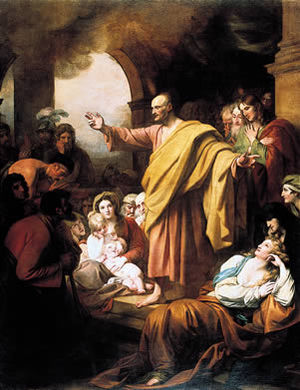 |
| Anonymous – Christ as the Good Shepherd, Vatican Museum |
As opposed to the good shepherd, the hired man is marked by two similar yet distinct traits: self-interest and disinterest in others. A focus on self above all and a turning away from others. When the wolf comes, our Lord says, the hired man runs away. His one concern is about saving himself while he also has no concern for the defenseless sheep.
Yet Christ is the good shepherd who loves his sheep. The good shepherd, in stark contrast to the hired man who works only for pay, is free. The good shepherd is not imprisoned by the narrow confines of self-interest and therefore he has true concern for the others. “I am the good shepherd, and I know mine and mine know me, just as the Father knows me and I know the Father; and I will lay down my life for the sheep.” (John 10:14)
We can say that Christ is, indeed, the freest person that ever walked the earth. Jesus’ freedom is not based in the grasping of pride (the sin of Adam and Eve) and the exerting of ones will over the other but in obedience to the Father. “…the Father knows me and I know the Father…” Jesus let go of the glory of God that was his due (Phil. 2:6-8) and, clinging to the guidance and movement of the Holy Spirit, aligned himself fully to the will of the Father.
Jesus knew that true freedom that each one of us at our core and in those silent and alone moments in our lives both yearn for and know that we are indeed meant for. This is the freedom that is able to say in regards to laying down ones own life, “No one takes it from me, but I lay it down on my own.” This is the essence of true freedom: the ability and willingness to lay down ones life on ones own.
How might we gain this true freedom? How might we be freed from the twin imprisonments of self-interest and disinterest in others? One word: “love” but here I want to make a qualification because this word is so bandied about in our day that it easily loses any real substance. It is worthy of note that the word “love” is used only once in today’s gospel passage (John 10:11-18) and it is not used in designating Jesus’ action toward the sheep. The words used in that regard are “knowing” and “laying down ones life”. The word “love” in this passage designates the Father’s response to the Son, “This is why the Father loves me, because I lay down my life in order to take it up again.”
The action of letting go of self, the action of turning toward the other in his or her need begets love. It helps to heal what is wounded within and it moves us toward that true freedom that is the defining characteristic of the good shepherd. There is a tried and true spiritual principle in this: if we find ourselves imprisoned in self-interest and disinterest then perform an act of gratuitous love, even the simplest of things and for even the briefest moment. In other words, for a moment turn your gaze away from yourself.
Love begets love and it brings healing and freedom. It also brings hope.
There is a very contemporary portrayal of this currently playing in movie theaters across our country. I have not yet read the books but last Thursday I saw the movie, The Hunger Games. At the heart of the movie (at least as I saw it) there is a moment where a young girl is killed in this competition that pits child fighting against child to the death. The heroine, who was trying to protect this young girl is heartbroken. But even in her pain and grief she does a tender thing. She gathers flowers and places them around the body of the young girl lying dead on the forest floor. In the cold world depicted in this story where, I would say, the sense of God has been lost (a world that at best can only say, “May the odds continually be in your favor.” rather than, “God be with you.”) the heroine performs a corporal work of mercy. She buries the dead and she does it in love. Via video cameras the nation watches this and in response in an imprisoned part of the country a riot against the injustice of the oppressors breaks out all because the heroine performed this simple act of taking the time to acknowledge the humanity and the dignity of this young girl. A humanity and dignity that all the “powers that be” were trying their best to negate.
The act of love itself begets love which brings healing, freedom and hope. “A good shepherd lays down his life for his sheep.”
This Sunday is Good Shepherd Sunday and a day when the Church asks us to pray in a special way for vocations to priesthood and religious life. Our world needs all Christians to learn the love and the true freedom of the good shepherd and to be set free from the prison of self-interest and disinterest. But our world and our church also needs men and women specifically willing to answer the call to love and lay down their lives as priests and men and women living the consecrated life. To our young people in a special way I want to say this: know that this type of love and the freedom it brings is possible. We can live free of self-interest and disinterest.
The act of love begets love.
Christ has loved us to the end and we live in the grace of that love.



